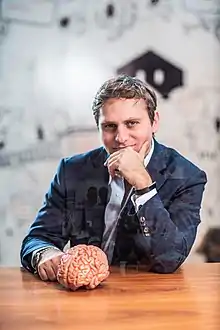Pascal Kaufmann
Pascal Kaufmann is a Swiss-based neuroscientist and entrepreneur.[1][2]
Pascal Kaufmann | |
|---|---|
 | |
| Born | March 19, 1978 Zurich, Switzerland |
| Occupation | Co-Founder together with Marc Vontobel of Starmind International, Founder of Mindfire Foundation |
| Known for | Cyborg Technology, Neuroscience, Artificial Intelligence, Humanoid Robotics, Brain Technology |
Early life
Pascal Kaufmann was born in Zurich, Switzerland. He joined the Kantonsschule Zürcher Unterland (KZU) with a focus on ancient languages and philosophy. Kaufmann received his master's degree in Neuroscience and Economics at the Swiss Federal Institute of Technology (ETH) in Zurich and Northwestern University in Evanston, Illinois, United States.
Career
In 2012, while at the Artificial Intelligence Laboratory of the University of Zurich Kaufmann initiated and developed a humanoid robot called Roboy, with Prof. Dr. Rolf Pfeifer. Roboy combines the latest insights from the field of embodied intelligence research and the most recent advances in the field of robotics.
Kaufmann takes on a more skeptical view on the current state of AI, in particular about the analogy that the brain is comparable to a computer.[3][4][5]
His vision "to think with the power of 1,000 brains" gave rise to the concept of the "Corporate Brain" which is today the core technology of the software company Starmind International which he founded with Marc Vontobel in 2010. The company is based in Zurich, Switzerland and has operations in New York and Frankfurt.
In 2017, Kaufmann initiated the non-profit Mindfire foundation dedicated to progressing AI openly, responsibly and ethically. In 2019, he gave rise to the Mindfire Group. Ultimately, to use the power of human level AI to solve our most pressing global challenges.[6][7] Kaufmann ist president of the Swiss AI Award dedicated to promoting artificial intelligence.[8]
References
- Pascal Kaufmann in interview with CNN Switzerland
- TV Interview from NYC, USA. "Pascal Kaufmann speaks about Elon Musk, Facebook, and the future of Cyborgs".
- Miller, Ron. "Artificial intelligence is not as smart as you (or Elon Musk) think".
- Datanami. "Why Cracking the 'Brain Code' Is Our Best Chance for True AI".
- www.update.ch, update AG. "Digital Talk: How intelligent is artificial intelligence". www.digitalday.swiss. Retrieved 2020-12-09.
- Büchi, Andres (July 2019). "Interview Beobachter" (PDF). Beobachter.
- "TechCrunch Interview". Youtube. 20 September 2018.
- "Swiss AI Award". AiCon - Amazing AI Innovations. Retrieved 2020-12-09.